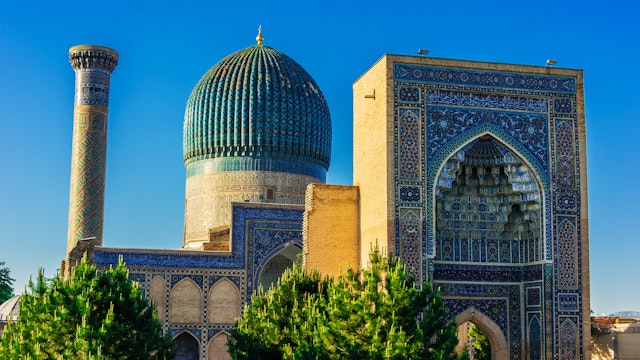The beautiful portal and trademark fluted azure dome of the Gur-e-Amir Mausoleum marks the final resting place of Timur (Tamerlane), along with two sons and two grandsons (including Ulugbek). It's a surprisingly modest building, largely because Timur was never expecting to be buried here. The tilework and dome are particularly beautiful; be sure to return at night when the building is spotlit to grand effect.
Timur had built a simple crypt for himself at Shakhrisabz, and had this one built in 1404 for his grandson and proposed heir, Mohammed Sultan, who had died the previous year. But the story goes that when Timur died unexpectedly of pneumonia in Kazakhstan (in the course of planning an expedition against the Chinese) in the winter of 1405, the passes back to Shakhrisabz were snowed in and he was interred here instead.
As with other Muslim mausoleums, the stones are just markers; the actual crypts are in a chamber beneath. In the centre is Timur’s stone, once a single block of dark-green jade. In 1740 the warlord Nadir Shah carried it off to Persia, where it was accidentally broken in two – from which time Nadir Shah is said to have had a run of very bad luck, including the near death of his son. At the urging of his religious advisers he returned the stone to Samarkand and, of course, his son recovered.
The plain marble marker to the left of Timur’s is that of Ulugbek; to the right is that of Mir Said Baraka, one of Timur’s spiritual advisors. In front lies Mohammed Sultan. The stones behind Timur’s mark the graves of his sons Shah Rukh (the father of Ulugbek) and Miran Shah. Behind these lies Sheikh Seyid Umar, the most revered of Timur’s teachers, said to be a descendant of the Prophet Mohammed. Timur ordered Gur-e-Amir built around Umar’s tomb.
The Soviet anthropologist Mikhail Gerasimov opened the crypts in 1941 and, among other things, confirmed that Timur was tall (1.7m) and lame in the right leg and right arm (from injuries suffered when he was 25) – and that Ulugbek died from being beheaded. According to every tour guide’s favourite anecdote, he found on Timur’s grave an inscription to the effect that ‘whoever opens this will be defeated by an enemy more fearsome than I’. The next day, 22 June, Hitler attacked the Soviet Union.
